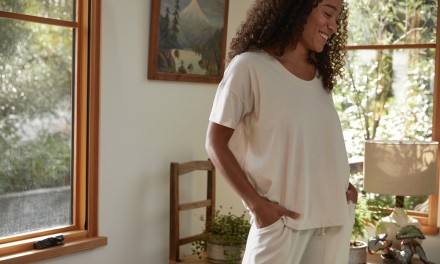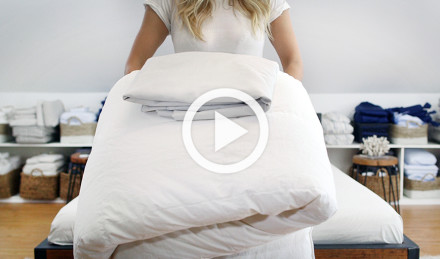When you see an organic label, what do you associate it with? Sustainability, luxury or ethically-made products? Do you see a better future where the earth is blissfully free of pollution and your children enjoy the cleanest air and water?
We’ve all impulsively purchased an inexpensive, ill-fitting polyester shirt on the internet. The allure of fast fashion is real, but natural clothing benefits much more than our peace of mind. As the fast fashion industry struggles to sustain itself, organic clothing is essential for healthy living and the sustainability of our planet.
What is Organic Clothing?
Organic clothing is clothing made from fibers grown without the use of genetic modification, artificial fertilizers, synthetic defoliants and toxic herbicides and insecticides. Sustainable clothing is also manufactured without the harmful chemicals typically used in textile processing. Commonly, you’ll see natural fibers like hemp, bamboo and flax, but the most popular organic fabric is cotton. Cotton is renowned for its comfort and durability.
To gain organic certification, organic cotton clothing brands must meet specific criteria from the FTC and USDA. You’ll see a tiny “USDA” organic stamp on these products — but this stamp only applies to organic crop cultivation. If you want to reap all the benefits of organic clothing, look for a certification that covers the manufacturing process, too. The Textile Exchange’s Global Organic Textile Standard (GOTSⓇ) and Oeko-Tex Standard 100 certification are the gold standards when it comes to sustainable clothing and ethical manufacturing of fabrics.
Parachute’s organic clothing is Oeko-Tex Standard 100 certified. Our sustainable commitment ensures that products meet the most stringent criteria, ensuring that every thread and button is free from chemicals proven to be dangerous to humans and the environment. You can learn more about Oeko-Tex certification in our guide: What Is Oeko-Tex? Learn About This Certification
What is Organic Clothing?
Organic clothing is clothing made from fibers grown without the use of genetic modification, artificial fertilizers, synthetic defoliants and toxic herbicides and insecticides. Sustainable clothing is also manufactured without the harmful chemicals typically used in textile processing. Commonly, you’ll see natural fibers like hemp, bamboo and flax, but the most popular organic fabric is cotton. Cotton is renowned for its comfort and durability.
To gain organic certification, organic cotton clothing brands must meet specific criteria from the FTC and USDA. You’ll see a tiny “USDA” organic stamp on these products — but this stamp only applies to organic crop cultivation. If you want to reap all the benefits of organic clothing, look for a certification that covers the manufacturing process, too. The Textile Exchange’s Global Organic Textile Standard (GOTSⓇ) and Oeko-Tex Standard 100 certification are the gold standards when it comes to sustainable clothing and ethical manufacturing of fabrics.
Parachute’s organic clothing is Oeko-Tex Standard 100 certified. Our sustainable commitment ensures that products meet the most stringent criteria, ensuring that every thread and button is free from chemicals proven to be dangerous to humans and the environment. You can learn more about Oeko-Tex certification in our guide: What Is Oeko-Tex? Learn About This Certification
Is Organic Clothing Sustainable?
Is Organic Clothing Sustainable?
In recent years, fast fashion has been in the hot seat as the world begins to understand the true environmental impact of the fashion industry. Turns out, it’s not so good. We’re buying more clothes than ever, but we’re also throwing away more clothes than ever. Most of that ends up in landfills or is burned (yes, even the clothes we don’t buy). This is why natural clothing brands have been touting sustainability — but is organic clothing actually sustainable? No matter how you swing it, organic clothing is usually much better for the environment.
You love cuddling up to your kids at bedtime, but you’ll sleep much easier knowing their pajamas are made from organic cotton and without harsh chemicals. Oeko-Tex-certified clothing choices ensure your loved ones don’t come into contact with substances that could cause harm. Organic clothing is the safer option. Here’s why:
It Doesn’t Contain Microplastics
When synthetic clothing breaks down, the result is microplastics. This pollutant doesn’t just harm marine life. It hurts humans, too. Scientists have linked microplastics to cancer and a number of other health issues — and children suffer the most.
Organic Clothing Uses Less Water
Industrial farming practices can use 2,700 liters of water just to produce enough organic cotton to make a single t-shirt. That’s roughly the same amount of water humans should drink in three and a half years. Organic cotton crops, which mostly rely on rainwater, use 91% less water by some estimates.
It Emits Less Greenhouse Gasses
The fashion industry has a massive carbon footprint. It’s responsible for 10% of the world’s carbon emissions, which is more than both maritime shipping and international flights combined. A surprising 70% of those emissions come from clothing production, and synthetic fibers have the biggest impact. So, how can organic clothes help?
Organic clothing production slashes greenhouse gases every step of the way. First, natural fibers are inherently eco-friendly. Cotton is one of the sustainable fibers with the lowest emission levels. Second, organic cotton farming emits 46% less greenhouse gases just by avoiding artificial fertilizer, which is responsible for the vast majority of nitrous oxide emissions in the U.S.. Should we care about N2O? According to one study, it’s “the single most important ozone-depleting emission.”
Organic Clothing Creates Less Pollution
Conventional farming and textile making rely on a long list of chemicals. By some estimates, 70% of China’s rivers and lakes are contaminated by wastewater produced by the textile industry. In the United States, polluted runoff remains the single biggest threat to clean water. Organic clothing cuts this chemical use and drastically reduces pollution.
It Reduces Landfill Waste
Americans throw away a lot of clothes. Every year, 12.8 million tons of textiles are discarded, but more than half of those are synthetic and can’t decompose in landfills. That’s a big problem that organic clothing brands aim to solve. Natural-fabric clothing is biodegradable as long as it’s untreated.
Is Organic Clothing Ethically Made?
Is Organic Clothing Ethically Made?
When we shop, most of us like to focus on supporting our community with our spending dollars. Efforts to shop locally make us feel good, but the garments we purchase locally create ripples beyond our own communities. It’s important to ensure that the garments you purchase were made ethically, no matter where in the world they were made.
As you explore new styles in stores and online, checking labels for certifications by organizations like Oeko-Tex ensures that your clothing purchase is safe for you, the environment and for the workers who helped manufacture it.
Parachute proudly offers Oeko-Tex certified organic clothing because we believe in stewardship toward the Earth and its many communities.
Oeko-Tex’s Beneficial Certification Requirements
To achieve Oeko-Tex certification, textiles and garments must meet a set of highly specific criteria related to physical safety. For example, all components from threads to zippers to linings must be free from harmful substances. Purchasing an Oeko-Tex certified garment lets you know that you aren’t bringing harmful chemicals into contact with your skin.
Learn more about why Oeko-Tex certification matters when buying new clothes in our What Is Oeko-Tex Textile Certification guide.
Oeko-Tex also establishes criteria related to worker safety and employment practices. These criteria ensure no worker is subjected to dangerous conditions while manufacturing certified garments.
Supporting Women’s Rights in Fashion
Women are the backbone of the fashion industry. In fact, almost 80% of garment workers around the world are female. Discussing ethical working conditions in the fashion industry means examining women’s rights during the manufacturing process. When you support Oeko-Tex certified clothing brands like Parachute, you’re using your purchasing power to make a statement about the importance of women’s rights in the workplace.
Each of Oeko-Tex’s certifications requires protection for textile workers. So when you purchase an organic cotton shirt that’s Oeko-Tex certified, you can feel confident the workers who helped make it earned fair wages, without fear of dangerous working conditions or discrimination.
Organic Manufacturing Is Safer for Workers
Choosing organic cotton clothing and other organic garments doesn’t just assure safety for the person wearing them. It also guards the safety for every pair of hands that come into contact with the item along the supply chain.
Manufacturing conditions in the United States are dictated by OSHA (Occupational Safety and Health Administration) to protect American garment workers. But — when garments are manufactured abroad, it can be harder to control the ethical implications of the manufacturing process.
That’s why consumers can feel good about purchasing Oeko-Tex certified garments. Oeko-Tex steps in to ensure that workers are protected from dangerous dyes, chemicals and manufacturing processes.
Organic Cotton Clothing vs. Conventional Cotton Clothing
Organic Cotton Clothing vs. Conventional Cotton Clothing
Is there a big difference between organic cotton clothing and conventional cotton clothing? Yes, but probably not one you’d notice with your eyes or hands. Organic cotton can be made into any type of conventional cotton textile, from canvas and denim to percale and chambray. It’s the processes that differ — and that’s what impacts your health.
Organic Clothing Is Farmed Differently
One of the most important differences between regular clothes and organic clothes is in the farming process. Organic farming never uses genetically modified seeds, and farmers use nutrient-rich soil rather than adding artificial fertilizer to over-irrigated land. Instead of toxic weed killers and insecticides, organic farmers use methods like trap crops and beneficial insects. Plants are naturally defoliated rather than using toxic chemical defoliants.
Organic Clothing Usually Is More Expensive
Organic clothes are typically more expensive than their non-organic counterparts. Since organic cotton doesn’t use GMO seeds, it produces a smaller yield. That means there’s less organic cotton available on the market. (Sustainable cotton makes up less than 1% of global cotton.) This drives up costs, but that’s just the price you pay for health and sustainability at home.
Popular Organic Clothing Items
Since organic cotton is so versatile, you’ll find it in just about everything, from work shirts to cozy robes. How do you choose? Always reach for quality.
Organic Shirts
Popular Organic Clothing Items
Since organic cotton is so versatile, you’ll find it in just about everything, from work shirts to cozy robes. How do you choose? Always reach for quality.
Organic Shirts
Tee shirts and button up shirts are wardrobe staples for a reason. Look for shirts made from a blend of Oeko-Tex Certified organic cotton and ultra-cozy jersey cotton.
Organic Cotton Tees for women sit comfortably against your skin thanks to a soft, stretchy jersey knit. The drop-shoulder boxy cut is perfectly casual at home. But paired with fresh blue jeans or your favorite leggings, you’ll look effortlessly chic no matter what you have planned. Choose from natural and subtle colors including Bisque, Bone and Coal.
With Organic Cotton Tees for men in your closet, you’ll never buy a six pack of stiff cotton undershirts again! The jersey knit fabric feels so good whether you’re hanging on the couch or running to the gym. Check out timeless colors like Moss, Coal and Fawn.
Organic Loungewear: Sweatshirts & Sweatpants
On chilly days, break out a comfy set of sweats and get cozy. Our limited edition Los Angeles-made Women’s Classic Crew Sweatshirt and Classic Sweatpants are deliciously soft thanks to their brushed fleece interior and 100% organic cotton fabric. Available in soothing colors like Raisin and Fawn, machine washable and pre-shrunk, these sweats will fit just as well on day one as they do on day one hundred.
The Men’s Classic Crew Sweatshirt and Classic Sweatpants you’ll find at Parachute feature the same great organic knitwear comfort and style. With understated colors like Raisin and Coal, clever features and trim, effortlessly soft, organic, high-quality cotton, these sweats are destined to become your new favorite loungewear.
Organic Robes
Organic cotton is often considered the premiere sustainable fabric for robes, especially if it’s woven into terry cloth. Wrap yourself in our Organic Cotton Robe and enjoy the simplicity of high-quality fabrics designed to help you feel good at any time of day. Machine washable and Oeko-Tex Standard 100 certified, this super-soft robe is one of the highlights of our organic sleep collection.
You’ll love the incredible softness of 100% organic cotton stretchy jersey knit. The relaxed fit lets you comfortably wear your organic robe layered with our other loungewear on cooler mornings. Two hip pockets add extra functionality, while classic colors like Coal and Bone will look great combined with your favorite pajamas.
Organic Home Items to Consider
It doesn’t stop at organic apparel. Your home is your sanctuary, and organic household products can make it just a little bit safer — both for your family and the world outside. Here’s how to pick the best of the best.
Organic Bed Sheets
Organic Home Items to Consider
It doesn’t stop at organic apparel. Your home is your sanctuary, and organic household products can make it just a little bit safer — both for your family and the world outside. Here’s how to pick the best of the best.
Organic Bed Sheets
Parachute makes it easy to bring the benefits of organic cotton into the bedroom. Our organic cotton bedding collection includes every element you need to make your bed feel like a cloud.
Mix and match with a la carte options like pillowcases and shams, top sheets, fitted sheets, duvet covers and quilts, or select a bed bundle for simplicity and instant softness. This organic, high-quality cotton bedding comes in a range of neutral and relaxing colors like Bisque, Tan, Pebble, Flax, Moss and Willow, to bring an added sense of harmony to your bedroom design.
All of our organic cotton sheeting is Oeko-Tex and GOTS certified. So — not only do you benefit from the peace of mind of knowing your bedding doesn’t contain harmful chemicals or toxins, but you can feel confident that it was manufactured in an environmentally friendly and ethical way.
Organic Comforters and Duvets
Comforters and duvets are all about filling and fabric. If you sweat in your sleep, you’ll probably want to reach for a linen duvet cover or comforter with a lightweight filling. If your house gets cold, opt for a thicker down filling. The bedroom tends to be one of the worst places for allergies, so down alternative duvet inserts and comforters can help keep symptoms at bay.
Organic Pillow Cases & Shams
Sleep soundly and awaken refreshed with an organic pillowcase nestled beneath you. Delight in the sleek softness of the crisp weave in Parachute’s Organic Cotton Pillowcases. Or enjoy the unique multi-layered fluffiness and subtle texture of our Organic Air Cotton Shams. Either way, you have plenty of deliciously comfortable options to choose from.
Organic Quilts & Throws
Snuggle up in style with an organic cotton quilt or blanket. Soft, yarn-dyed organic cotton fabric is the perfect choice when you want to wrap yourself in a layer of sustainable, ethical comfort.
The Organic Air Cotton Quilt, perfect for those cooler days, is certified organic by Oeko-Tex. The air cotton quilt comes in subtle colors too, including Bisque, White and Pebble.
Enjoy the timeless appeal of a chunky, knit-stitched throw blanket without a fiber of worry. Our Organic Cotton Knit Throw, in either Pebble or Sand, is certified organic by Oeko-Tex.
Organic Towels
Organic Cotton Towels are wonderfully absorbent and delightfully soft. Reward yourself daily by drying off with subtly textured, certified organic cotton towels in a variety of sizes and colors. Choose from Willow, White and Flax and enjoy the benefits of bringing Oeko-Tex and GOTS certified organic cotton into your bathroom!
Buying Organic Clothing is Worth It
There’s always the impulse to pull the trigger on a fast-fashion outfit that’s been carefully marketed to us on Instagram. Is it worth it? Probably not. The truth is that you just can’t put a price on the health of your family or the planet. Organic clothing helps give us the future we all want: one where our children can thrive.
At the end of the day, we can’t pack up and leave Earth just yet, so we have to protect what we have — and that starts with our health. Oeko-Tex certification can ensure all of your family’s clothing is completely free of harmful chemicals. It won’t hurt even the most sensitive skin. Ready to shop? Browse Parachute’s Oeko-Tex line.
For more home and lifestyle information, read on:
Are Organic Sheets Worth It? What to Look for in Organic Bedding
Home Fragrance Guide: How to Make Your Home Smell Good
Simple Ways to Freshen Your Home This Spring
Summer Home Decor Ideas: Room-by-Room Inspiration
Winter Home Decor Ideas: Room-by-Room Inspiration
How to Wash and Properly Care for Bedding
How Often Should I Wash Cotton Sheets?
New Home Checklist: Essential Things to Buy or Upgrade When Moving In
Sateen vs. Satin vs. Silk: What's the Difference?
Buying Organic Clothing is Worth It
There’s always the impulse to pull the trigger on a fast-fashion outfit that’s been carefully marketed to us on Instagram. Is it worth it? Probably not. The truth is that you just can’t put a price on the health of your family or the planet. Organic clothing helps give us the future we all want: one where our children can thrive.
At the end of the day, we can’t pack up and leave Earth just yet, so we have to protect what we have — and that starts with our health. Oeko-Tex certification can ensure all of your family’s clothing is completely free of harmful chemicals. It won’t hurt even the most sensitive skin. Ready to shop? Browse Parachute’s Oeko-Tex line.
For more home and lifestyle information, read on:
Are Organic Sheets Worth It? What to Look for in Organic Bedding
Home Fragrance Guide: How to Make Your Home Smell Good
Simple Ways to Freshen Your Home This Spring
Summer Home Decor Ideas: Room-by-Room Inspiration
Winter Home Decor Ideas: Room-by-Room Inspiration
How to Wash and Properly Care for Bedding
How Often Should I Wash Cotton Sheets?
New Home Checklist: Essential Things to Buy or Upgrade When Moving In
Sateen vs. Satin vs. Silk: What's the Difference?














